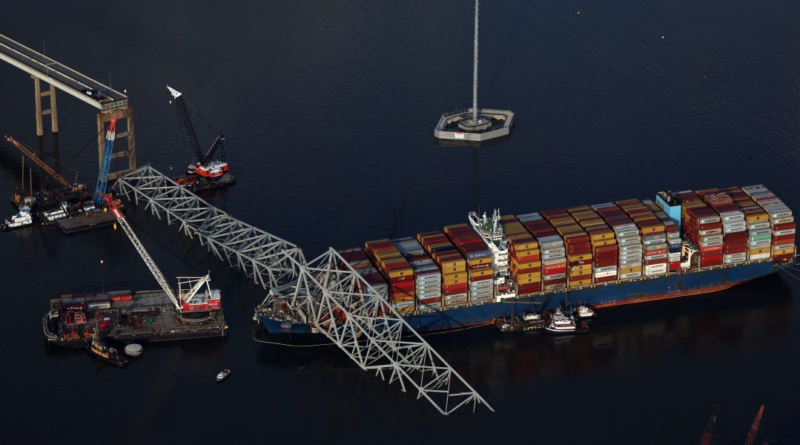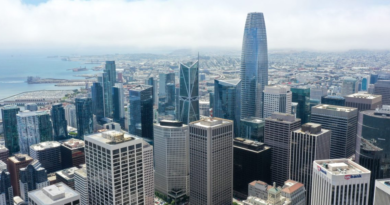Baltimore accuses the owner and operator of Dali ship that collapsed bridge of providing ‘incompetent’ crew and ‘clearly unseaworthy’ vessel
The mayor and city council of Baltimore have launched a legal claim against both the owner and manager of a ship that crashed into the Francis Scott Key Bridge last month, leaving six men presumed dead.
The 985-foot vessel collided with one of the bridge’s supporting columns on March 26, causing the structure’s collapse into the Maryland harbor.
The Dali, which at the time of the accident was carrying 4,700 shipping containers, is owned by Singapore-based Grace Ocean Private Ltd. and managed by Synergy Marine Pte Ltd.
Both companies are named in the lawsuit filed Monday by the City of Baltimore. The city is seeking significant damages not limited to the funds needed to rebuild the bridge, as well as costs associated with a loss of trade, tax revenue, and public welfare expenditures.
The claim, seen by Fortune, lays out more than 20 allegations about the failures of Grace Ocean and Synergy Marine, pointing out that prior to the incident thousands of boats a day passed beneath the bridge.
“None of this should have happened,” the suit reads. “Reporting has indicated that, even before leaving port, alarms showing an inconsistent power supply on the Dali had sounded. The Dali left port anyway, despite its clearly unseaworthy condition.”
The Dali had been bound for Sri Lanka, but the claim adds that 12 minutes after leaving its dock, the vessel’s onboard data recorder picked up “numerous aural alarms” relating to a loss of power.
The claim continues that while a backup generator was on board it was not powerful enough to get the boat back under control, meaning it hit the bridge at approximately 7 knots.
Grace Ocean and Synergy Marine have sought to limit their liabilities in the matter to $43.67 million under a pre–Civil War protection that means their liability can be capped at the value of the vessel’s remains after a casualty.
The liability limitation, filed by both companies in early April, also categorically denies any wrongdoing on their part in the incident. It said: “The casualty was not due to any fault, neglect, or want of care on the part of petitioners [Grace Ocean and Synergy Marine], the vessel, or any persons or entities for whose acts petitioners may be responsible.”
It adds if any such faults did occur—which it denies—these “occasioned and occurred without petitioners’ privity or knowledge.”
In the weeks and months following the incident, Synergy Marine has repeatedly offered condolences to the families of the men who died in the bridge collapse. In an update on April 2, the business added: “Ensuring the safety and well-being of the crew during this time is a critical priority for us. We have been actively engaged in a range of actions to support them since the incident.”
But the filing from Baltimore, submitted a matter of weeks later, gives a damning rebuttal to the businesses’ denial. The claim this week said the companies provided the Dali with an “incompetent” and “inattentive” crew, who lacked the proper skills and training to be on board.
The claim also alleges the businesses “provided a vessel with unseaworthy equipment” and failed to maintain the ship’s engines, systems, and steering.
Representatives for Grace Ocean and Synergy Marine told Fortune it would be inappropriate to comment at this time given ongoing investigations.
‘Economic engine brought to a grinding halt’
The mayor and city council of Baltimore have already countered the maritime businesses’ request for limited liability, asking the court to throw out the petition and find the pair “liable for all damages arising from the allision of the Dali into the Key Bridge.”
And if the mayor’s office is awarded the sums it is looking for, it will likely be significantly more than $43 million.
The court documents outline that the Port of Baltimore raked in more than $70 billion in 2023 alone, as well as 51,365 direct, induced, and indirect jobs supported by the site.
This “economic engine,“ once a “reliable constant” for the city of Baltimore, ground to a “halt” on March 26, the suit continues. “It is difficult to overestimate the Port’s import to the local economy,” the suit adds.
As such, the proposed bill for the ship companies is long. Baltimore is seeking the funds to cover the design, development, and rebuild of the bridge, as well as the costs incurred by the obstruction of the Patapsco River after the collision.
On top of that, the city is seeking damages covering the interruption of transportation around Baltimore, the costs needed for improved road maintenance for traffic which otherwise would have gone over the bridge, increased spending on police services, fire services, and other public employee overtime.
Elsewhere Baltimore is pushing to have its loss of income and property tax covered by the companies, as well as the bill for the cleanup operation after the incident. Baltimore is also requesting a fee for the public nuisance caused by the collision and the stockpiling of “hazardous substances” caused by the port’s reduced activity.




